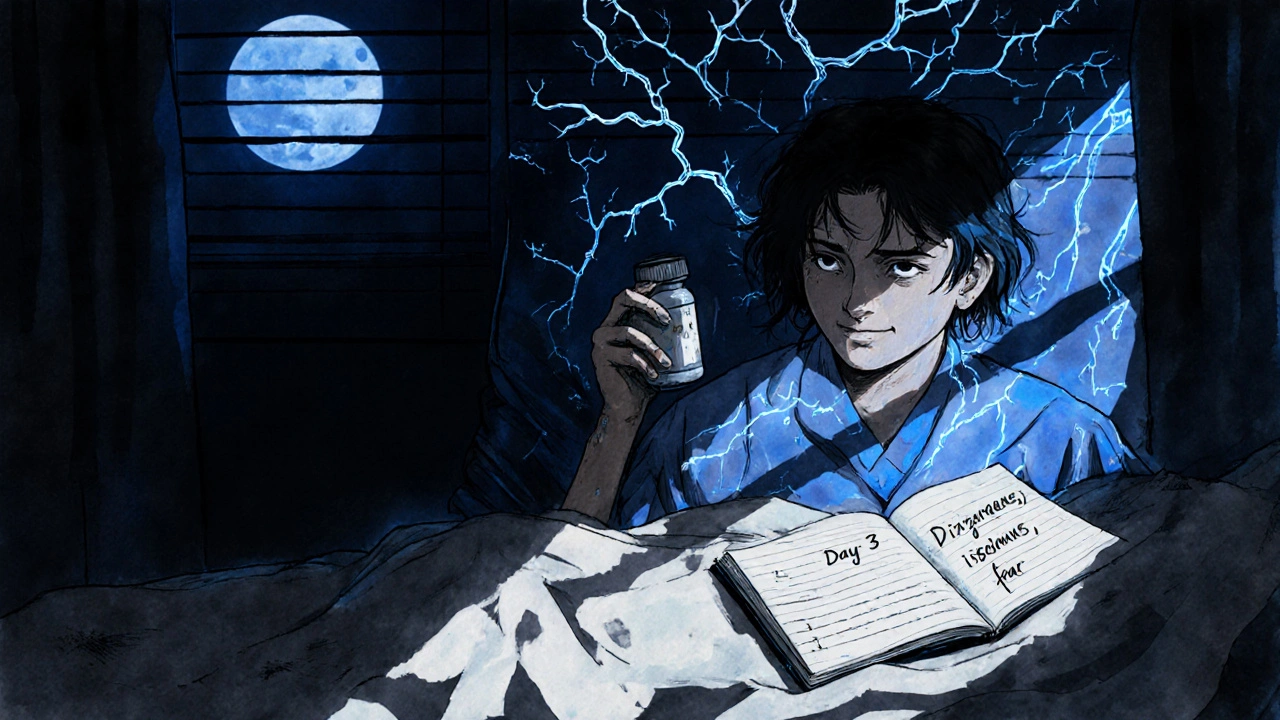Stopping carbamazepine isn’t like quitting caffeine. If you’ve been taking it for seizures, bipolar disorder, or nerve pain, your body has adapted to it. Suddenly stopping can trigger serious reactions-seizures, extreme anxiety, even psychosis. That’s why withdrawal needs a plan, not just willpower.
What Happens When You Stop Carbamazepine?
Carbamazepine works by calming overactive nerve signals in your brain. When you take it daily, your brain adjusts its natural activity to work around the drug. Cut it out too fast, and those signals go haywire. That’s when withdrawal kicks in.
Common symptoms show up within 1-7 days after your last dose. You might feel dizzy, nauseous, or get headaches. Some people report insomnia, sweating, or mood swings. But the most dangerous risks are seizures and rebound pain. People with epilepsy who quit cold turkey have a 30-50% chance of having a seizure within the first two weeks. That’s not a gamble you want to take.
A 2023 study in the Journal of Neurology tracked 142 patients who stopped carbamazepine. Of those who tapered slowly over 4-8 weeks, only 8% had breakthrough seizures. Of those who stopped abruptly, 47% did. The difference isn’t small-it’s life-changing.
How Long Do Withdrawal Symptoms Last?
There’s no one-size-fits-all timeline. For most, physical symptoms like dizziness or nausea fade within 1-2 weeks. But brain-related symptoms-mood swings, anxiety, trouble sleeping-can linger for weeks or even months. This is called protracted withdrawal.
Why does it last so long? Carbamazepine affects neurotransmitters like serotonin and GABA. When the drug leaves, your brain has to rebuild its own balance. That takes time. One patient in Adelaide, a 52-year-old teacher with trigeminal neuralgia, told me her anxiety didn’t settle until 11 weeks after her last pill. She tapered over 10 weeks, but still needed extra support.
Don’t confuse withdrawal with relapse. If your original condition returns-like seizures or intense nerve pain-it’s not necessarily because the drug didn’t work. It’s because your brain hasn’t relearned how to regulate itself yet.
How to Taper Off Carbamazepine Safely
The only safe way to stop is slowly. No shortcuts. No “I’ll cut my dose in half this week.” Doctors usually recommend reducing your dose by 10-25% every 1-2 weeks. But that’s just a starting point. Your exact plan depends on:
- How long you’ve been taking it (longer use = slower taper)
- Your original diagnosis (epilepsy needs more caution than nerve pain)
- Your current dose (higher doses require longer tapers)
- Your history of seizures or mood episodes
For example, someone on 800 mg daily for 3 years might drop to 600 mg for 14 days, then 400 mg for 14 days, then 200 mg for 14 days, then stop. That’s about 10-12 weeks. Someone on 200 mg for 6 months might go from 200 → 150 → 100 → 50 → 0 over 6 weeks.
Never adjust your dose without your doctor’s approval. Even if you feel fine, your brain might still be vulnerable. Keep a symptom journal. Note sleep, mood, headaches, tremors. Bring it to your next appointment. It helps your doctor fine-tune your taper.

What to Do If Withdrawal Symptoms Get Worse
Some symptoms are normal. Others are red flags. Here’s what to watch for:
- Normal: Mild dizziness, tiredness, occasional headaches, temporary mood dips
- Warning signs: New or worsening seizures, hallucinations, chest pain, rapid heartbeat, suicidal thoughts, severe confusion
If you have any warning signs, contact your doctor immediately-or go to the nearest emergency department. Don’t wait. Carbamazepine withdrawal can be life-threatening.
Some people need a temporary return to a low dose if symptoms get too intense. That’s not failure. It’s medicine. One man in Melbourne stopped carbamazepine too fast and had three seizures in 48 hours. He was put back on 100 mg for two weeks, then restarted his taper at half the speed. He’s now seizure-free for 18 months.
Support Systems That Actually Help
Withdrawal isn’t just physical. It’s emotional. You might feel isolated, scared, or guilty for wanting to stop. You’re not alone. Here’s what helps real people:
- Therapy: CBT helps manage anxiety and fear around symptoms. A therapist can teach grounding techniques for panic or dissociation.
- Support groups: Online forums like r/Carbamazepine on Reddit or the Epilepsy Foundation’s community give you people who’ve been there. Just don’t take medical advice from strangers.
- Sleep hygiene: Poor sleep worsens everything. Stick to a routine. No screens an hour before bed. Keep your room cool and dark.
- Nutrition: Low blood sugar can trigger dizziness or mood crashes. Eat small, balanced meals. Avoid alcohol-it worsens withdrawal.
- Exercise: Even a 20-minute walk each day helps regulate your nervous system. It doesn’t have to be intense.
One woman in Adelaide started daily walks with her dog after stopping carbamazepine. She said the rhythm of walking-step, step, step-helped her brain feel grounded again. It sounds simple, but it worked.

What Comes After Stopping?
After you’re off carbamazepine, your body isn’t done adjusting. It can take 3-6 months for your brain chemistry to fully stabilize. During this time:
- Keep seeing your doctor every 4-6 weeks
- Don’t start new medications without checking for interactions
- Watch for signs your original condition is returning
- Be patient with yourself. Healing isn’t linear
Some people never need another medication. Others switch to something like lamotrigine or oxcarbazepine. That’s a decision for your neurologist, not a blog post. But know this: stopping carbamazepine doesn’t mean you’re giving up. It means you’re taking control.
Frequently Asked Questions
Can you die from carbamazepine withdrawal?
Yes, in rare cases. The biggest risks are uncontrolled seizures and severe psychiatric reactions like psychosis or suicidal behavior. These are most likely if you stop abruptly, especially at high doses or after long-term use. Never stop without medical supervision.
How long should I taper off carbamazepine?
It depends on your dose and how long you’ve taken it. For most people, a taper lasts 4 to 12 weeks. Higher doses or longer use (over 2 years) often need 3-6 months. Your doctor will personalize your plan based on your medical history.
Will I have withdrawal symptoms if I miss one dose?
Missing one dose usually won’t cause withdrawal, but it can trigger breakthrough symptoms if you’re sensitive. Carbamazepine has a half-life of about 30-40 hours. If you miss a dose, take it as soon as you remember-unless it’s close to your next one. Never double up. If you miss more than one, call your doctor.
Can I switch to another medication instead of stopping completely?
Yes, many people switch to alternatives like lamotrigine, oxcarbazepine, or valproate. This is called cross-tapering. Your doctor will gradually reduce carbamazepine while slowly increasing the new drug. This reduces withdrawal risk and keeps your condition controlled. It’s often safer than stopping cold.
Is it safe to stop carbamazepine during pregnancy?
Carbamazepine can increase risks to a developing baby, including birth defects. But stopping suddenly can be even more dangerous for both you and the baby if seizures return. Never stop or change your dose during pregnancy without consulting your neurologist and obstetrician. A carefully managed taper or switch to a safer medication may be recommended.
Next Steps and Troubleshooting
If you’re thinking about stopping carbamazepine, here’s what to do next:
- Write down why you want to stop. Is it side effects? Desire for natural living? Cost? Clarity helps your doctor help you.
- Book an appointment with your prescribing doctor. Don’t wait until you’re feeling awful.
- Ask for a written tapering plan. Get it in writing. Know the exact doses and timeline.
- Set up check-ins. Schedule follow-ups every 2-4 weeks during taper.
- Prepare your support system. Tell a trusted friend or family member what you’re doing. Ask them to watch for warning signs.
If you’ve already stopped and are struggling, don’t panic. Call your doctor. Even if it’s been a week or two, it’s not too late to get help. Withdrawal is treatable. You’re not broken. You’re healing.


Erin Corcoran
October 30, 2025 AT 17:00OMG YES THIS. I tapered over 10 weeks after 4 years on carbamazepine for bipolar II and honestly? The brain fog lasted longer than the dizziness. 😅 But walking my dog every morning-same time, same route-was the only thing that made my nervous system feel like it wasn’t falling apart. Also, no alcohol. Not even one beer. Trust me.
shivam mishra
November 1, 2025 AT 07:03As a neurologist in Mumbai, I’ve seen this too many times. Patients stop abruptly because they think ‘it’s just a seizure med’-but carbamazepine modulates sodium channels and GABAergic transmission. Abrupt discontinuation = cortical hyperexcitability. The 47% seizure rate in abrupt stoppers? Real. Tapering isn’t optional-it’s neuroprotective. Always document baseline EEGs before tapering.
Scott Dill
November 1, 2025 AT 20:45Just wanted to say-this post saved my life. I was gonna quit cold turkey because I was tired of feeling like a zombie. Then I read the part about the Adelaide teacher and thought… yeah, maybe I don’t wanna end up in the ER. Started tapering last week. Still shaky, but no seizures. Still alive. Still fighting. 💪
Arrieta Larsen
November 2, 2025 AT 06:17I didn’t realize how much my anxiety was tied to the med until I started tapering. It wasn’t withdrawal-it was my brain remembering how to be anxious again. Took 3 months to feel normal. Therapy helped more than I expected.
Mike Gordon
November 2, 2025 AT 15:42Carbamazepine withdrawal is underdiscussed. People think it’s like quitting sugar. It’s not. It’s like suddenly removing the foundation of your house and hoping the walls don’t collapse. I’ve seen three people hospitalized after quitting cold turkey. One lost her job. One lost custody. One died. Don’t gamble with this.
Kathy Pilkinton
November 3, 2025 AT 17:30Oh wow. So you’re telling me that people who think they can just ‘go off meds because they’re tired of them’ are basically playing Russian roulette with their brain? And we wonder why ERs are full? No. Just. No. If you’re too lazy to follow a taper schedule, maybe you shouldn’t be on the drug in the first place. Seriously. This isn’t a lifestyle choice. It’s neurobiology.
Holly Dorger
November 5, 2025 AT 09:21my friend stopped carbamazepine and her seizer came back so bad she had to go to hospitel. she was so scared. she started walking her cat every day (yes her cat) and it helped her feel calmer. i didnt think a cat could help but it did. also no caffeine. no sugar. just water and naps. it took 6 months but she is okay now. 🙏
Amanda Nicolson
November 5, 2025 AT 21:02I tapered over 6 months. Six. Months. I cried every single day for the first two. I thought I was losing my mind. I kept thinking, ‘Is this normal? Is this it? Am I broken?’ I went from a 1200mg daily dose to zero. My therapist said my brain was rewiring itself like a city rebuilding after a hurricane. And you know what? She was right. It’s not linear. Some days I felt fine. Other days I couldn’t get out of bed. But I kept showing up. For myself. For my kids. For the version of me that didn’t want to be medicated forever. And now? I’m 11 months off. I still have bad days. But I don’t have seizures. And I finally feel like me again. Not the version of me that was just waiting for the next pill.
Jackson Olsen
November 6, 2025 AT 18:27Just stopped 2 weeks ago. Still dizzy. But no seizures. Took 4 weeks to taper from 400 to 0. Doc said I was lucky. My cousin did it faster and ended up in ICU. Don’t be like my cousin.
Penny Clark
November 8, 2025 AT 11:37hi i just wanted to say thank you for this post. i’ve been tapering for 8 weeks and i kept thinking i was going crazy. the mood swings were wild. i started journaling and now i can see patterns. also i found a reddit group called r/Carbamazepine and it helped so much. not for medical advice, just to know i wasn’t alone. i’m still tired but i’m hopeful. 🌱
Niki Tiki
November 9, 2025 AT 06:20Why are we even talking about tapering? Just stay on the pill. America’s obsession with ‘natural living’ is killing people. You think your body knows better than a 2023 clinical trial? No. It doesn’t. If your doctor says stay on it, stay on it. Stop being a biohacker. Your brain isn’t a TikTok trend.